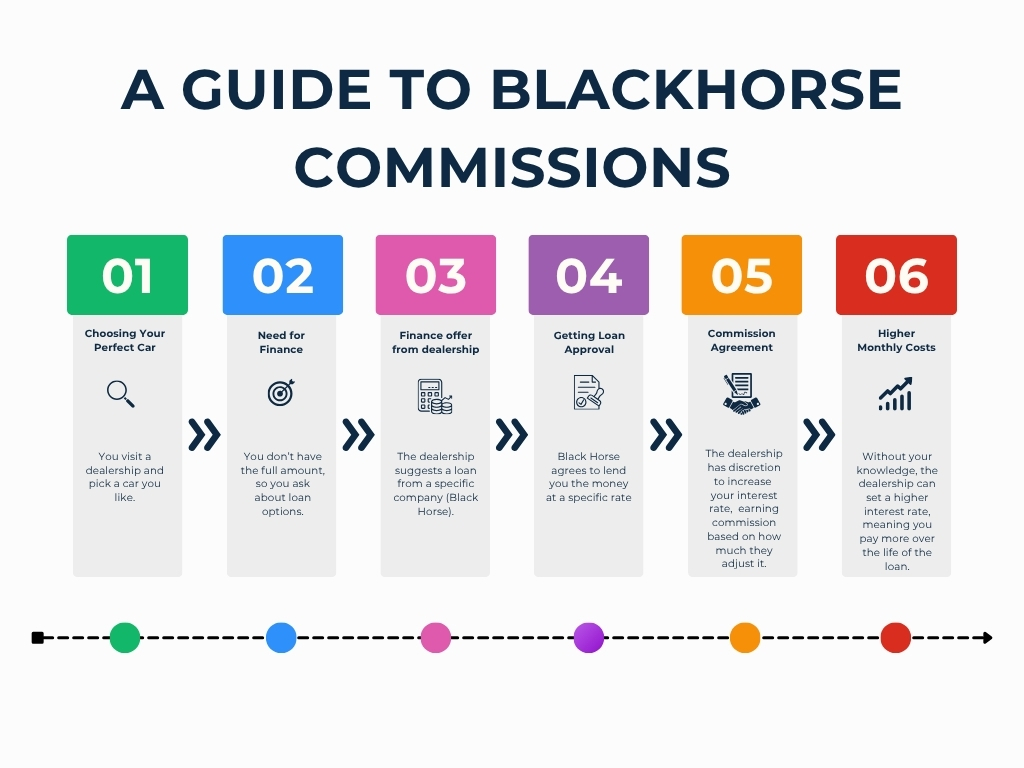Black Horse (or Blackhorse) finance customers are realising that they could be owed significant compensation if they make what is often called a Blackhorse car finance claim or a Blackhorse PCP claim. If you’re wondering whether you’re entitled to a Blackhorse finance refund, this comprehensive guide will explain everything you need to know about pursuing Blackhorse compensation.
Black Horse Limited, part of Lloyds Banking Group, is one of the UK’s largest motor finance providers. If you’ve had a car finance agreement with Blackhorse since 2007, you could be eligible for compensation due to hidden commission arrangements.
What Are Discretionary Commission Arrangements?
In 2021, the industry regulator, the Financial Conduct Authority, banned finance providers like Blackhorse from benefiting from ‘Discretionary Commission Arrangements’ (DCA). This was where a lender, like Blackhorse, was willing to give a customer a car finance agreement at a certain interest rate, but there was a secret deal between the finance provider and the car dealership whereby the car dealership could increase the interest rate on the loan – so that the higher the interest was increased, the more money the car dealership made for themselves.
This practice was banned because of the harm caused to customers. It meant that customers were paying more for their finance arrangement just so that the car dealership could make more money for themselves, which brings into question whether the car dealer placed the customer with the best lender for their needs – or whether the car dealer was only looking out for themselves. Many customers now consider this as mis-sold car finance due to the hidden commission structure.

The Landmark Mrs Y Case: A Game-Changer for Black Horse Claims
Following the ban by the regulator, if lenders like Blackhorse thought this was the end of the story, they were wrong. Shortchanged customers made claims for a refund of this extra interest, even though the DCA arrangements were made prior to 2021 when it was still within the rules.
On 10th January 2024, the Financial Ombudsman Service (FOS) published some groundbreaking decisions about cases, one of which was brought by ‘Mrs Y’ – a Blackhorse finance claim that sent shockwaves through the industry.
Key Details of the Mrs Y Decision
While it was common practice for FOS to publish its decisions, the case of Mrs Y versus Blackhorse was 64 pages long – much longer than the average published decisions. FOS were setting out their stance on Blackhorse finance compensation claims such as Mrs Y’s.
The outcome of that decision was that Blackhorse had to refund Mrs Y some of her interest charges, to compensate her for the hidden commission. The car finance agreement Mrs Y took out was in April 2016, which (being before 2021) was within the rules for Blackhorse to operate a Discretionary Commission arrangement, but the Ombudsman still ruled it was unfair.
In Mrs Y’s case, over £1,146 was paid in discretionary commission from Blackhorse to the car dealership, acting as the broker. This was all extra interest charged because of the secretive arrangement between Blackhorse and the car dealership.
Another Legally Binding Decision: Miss L vs Barclays Partner Finance
Another case published on 10th January 2024 about Discretionary Commission Arrangements was Miss L versus Barclays Partner Finance. Like the Blackhorse claim, the Ombudsman instructed that compensation must be given for the unfair commission arrangement. The ombudsman’s decision was 70 pages long and clearly intended to establish that even if the commission arrangement was technically within the rules (Miss L’s finance agreement started in 2018), it doesn’t mean it was fair on the customer. Find out more on the “hidden costs of car finance”.
Court Validation of Ombudsman Decisions
In Miss L’s case, Barclays Partner Finance strongly disputed the Ombudsman’s decision, clearly worried that they would have to pay compensation for many of their other customers in the same circumstances. So, Barclays Partner Finance decided to take the Ombudsman to Court under what’s called a Judicial Review.
This court case (the Barclays judicial review case) was heard in December 2024 and resulted in the Judge siding with the Ombudsman and rejecting Barclays’s arguments.
What This Means for Your Black Horse Finance Claim
So, what does this mean for Blackhorse finance compensation claims? It means that the Financial Ombudsman Service has set out in detail why and how these Discretionary Commission Arrangements can be unfair, and that the Ombudsman’s view has been backed up by a Judge in Court when Barclays Partner Finance judicially reviewed FOS.
All this has given the Financial Conduct Authority pause for thought while it works out how affected customers should be compensated. The regulator’s response has been to allow more time for lenders like Blackhorse, Barclays Partner Finance, or Close Brothers to respond to these claims for compensation for historic commission arrangements (typically from 2007 to January 2021). This means they’re allowed to pause on answering these claims until at least 4 December 2025, when the FCA will provide further guidance.
How Much Compensation Could You Claim from Black Horse?
Based on the Mrs Y case and similar decisions, Blackhorse car finance compensation can be substantial. In Mrs Y’s case, over £1,146 was refunded just for the hidden commission element. Your Blackhorse PCP claim amount will depend on:
- The size of your original finance agreement
- The interest rate you were charged
- The length of your agreement
- The amount of commission paid to the dealer
Many customers could be owed compensation for their mis-sold car finance agreements.
Can You Still Claim for Post-2021 Finance Agreements?
If you took out car finance after 2021 with Blackhorse, then there wouldn’t have been a Discretionary Commission Arrangement because the regulator had already banned them by that time. However, it is still possible that you could be due compensation.
This is because of a Court of Appeal case from October 2024 about three customers – Johnson, Wrench and Hopcraft. A car dealership having the discretion to adjust the interest rate was not the only way secretive commission arrangements have been made between car finance providers and car dealers.
Other Types of Commission Arrangements
For example, the lender may simply pay a fixed commission to the car dealer to incentivise the car dealer to direct the customer towards that particular lender over another lender. This can mean that customers do not get the best deal on their car finance arrangement because the car dealer is too preoccupied with what they will earn from the deal, rather than trying to save the customer money.
Eligibility Criteria for Black Horse Finance Claims
You may be eligible for a Blackhorse refund if:
- You had a PCP, hire purchase, or personal loan agreement with Black Horse Limited
- Your agreement was taken out between 2007 and January 2021 (for DCA claims)
- You weren’t told about commission arrangements
- You believe you paid more due to hidden commissions
Even if your agreement has ended or you’ve settled early, you can still pursue your Blackhorse PCP claim.
Ready to Start Your Black Horse Finance Claim?
If you believe you’re entitled to Blackhorse finance compensation and want to start a Blackhorse finance claim against Black Horse Limited, you can begin the process today. Join thousands who’ve already started their claim before the FCA pause is lifted in December 2025.
With platforms like Allegiant Finance available to help customers navigate these complex claims, pursuing the compensation you deserve has never been more straightforward.
The landmark cases and court decisions have established clear precedents for Blackhorse finance refund claims, giving customers the legal backing they need to pursue compensation for unfair commission arrangements.
If you want to start a car finance claim against Blackhorse, click on the Apply Now button.
Apply Now
Glossary
PCP (Personal Contract Purchase):
A type of car finance agreement where you pay a deposit and monthly payments, with the option to buy the car at the end by paying a final “balloon payment.” The loan is secured against the car.
DCA (Discretionary Commission Arrangement):
An arrangement where a lender allows a broker or dealer to set the customer’s interest rate, with the broker’s commission increasing as the interest rate rises. This practice was banned by the FCA in 2021 due to lack of transparency and consumer harm.
FOS (Financial Ombudsman Service):
An independent body that resolves disputes between consumers and financial businesses, including car finance complaints.
FCA (Financial Conduct Authority):
The UK regulator overseeing financial markets and firms, responsible for banning DCAs and currently reviewing how customers should be compensated for historic commission arrangements.
Judicial Review:
A legal process where a court reviews the lawfulness of a decision or action made by a public body, such as the FOS. Used by Barclays Partner Finance to challenge the FOS decision, but the court upheld the Ombudsman’s ruling.
Commission:
A payment made by a lender to a broker or dealer for arranging a finance agreement. Commissions can be fixed or discretionary, and must be properly disclosed to the customer.








